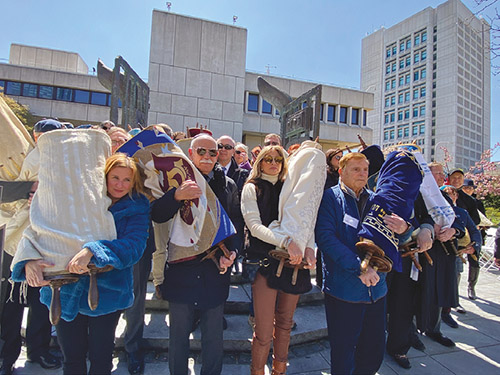


On April 28, The Holocaust and Human Rights Education Center (HHREC) and Westchester Jewish Council presented their Annual county-wide Yom Hashoah Holocaust Commemoration program, Keeping the Memory Alive, at the Garden of Remembrance in White Plains. The program featured a procession of Holocaust-rescued Torahs. This marked the 30th anniversary of the Holocaust Garden of Remembrance, memorializing millions of lives lost.
Michael Gyory, HHREC chairperson, opened the event. “I’m reminded of antisemitism on the rise throughout the world, and even at home in Westchester. But as a child of Hungarian Holocaust survivors, I’m the least surprised. We know what extermination and antisemitism looks like.
“Imagine a teenager in Budapest,” Gyory continued. “Your families stretch so far back in time that nobody remembers a time when you weren’t a Hungarian family of professionals, comfortable in the middle and upper class. In less than a generation, life falls off a cliff. Your home is stolen, parents murdered, and your way of life literally no longer exists. Please don’t expect me to be shocked that antisemitism is all around us.”
Westchester Executive George Latimer began: “Across the world, we are seeing a terrible war of aggression. The temptation is to point to the source of the aggression in the Kremlin. We can fall into the same trap about the Holocaust. We personify it in one man who wrote a book in the 1920s called “Mein Kampf,” laying out what he would do, and he did exactly that. But no one could be the author of the horrors of the Holocaust. There had to be individuals willing to subordinate proper morality to allow this to happen and to advance it.
“It’s a short trip from disinterest to indifference to dehumanization, hatred, and persecution,” Latimer noted. “That it happened once was not just a historic statement. We are vigilant every day, remembering those that died, and never forget how it came to pass. Citizens and public officials have our responsibility. If we do our job well, we pass this baton on to the next generation for them to do their job. We say, ‘Never again’.”
Aliza Erber delivered the remembrance remarks. She described her mother Helga’s well-to-do, secular Austrian-Dutch family, with a nanny, a cook and two chambermaids. She knew very little about Judaism, and if she ever thought about family law, she would have identified as a Christian. Her grandmother was born Catholic in Hungary. Her great-grandmother had married a Jew and that didn’t impact their lives in the Hague until May 16, 1940. Under Nazi blood laws. If someone in your family tree married a Jew, you also were a Jew, even if you converted and practiced Christianity.
With her family on a deportation list, “the time had come for my mother to go into hiding. The first hiding place was with a Dutch farm family. With eight kids of their own, she blended in as number nine.”
Helga and an underground fighter 16 years older, Richard Levy, became engaged. Richard was soon taken to Westerbork, a Dutch transit camp from which prisoners were transported to labor or extermination camps further east. In November 1942, the Judenrat gave her permission to visit Richard in Westerbork. On November 25, 1942, they were married there. Erber has their marriage certificate on Westerbork stationery, “a very rare document.” From Westerbork, Richard went to Bergen-Belsen, Terezin and Auschwitz, where he died in August 1944. Another document she possesses is an affidavit by two Auschwitz survivors, signed and notarized after the war, of two eyewitnesses to his death.
Erber was born on April 2, 1943 and the family had to go literally underground. She explained, “A few months after birth, I was hidden for my own safety. A righteous Christian doctor and nurses dug an underground bunker where Jewish infants were hidden. This doctor, to whom I owe my life, was an upstander, not a bystander. I don’t even know his name.” Erber was hidden for almost two years. “I never saw the sky or sun. Nourishment consisted of boiled grasses and roots. I went in as a preverbal infant and emerged at age 2 on the verge of starvation, barely able to sit or stand.” Erber and her family moved to Israel after the war.
Commemorative candles were then lit by the Somers Holocaust Commission student winners.
WJC President William Schrag concluded the program. “Westchester is the home of 160,000 Jews, the eighth largest of the United States,” he said. “In less than a decade, we won’t be able to hear the firsthand accounts of Holocaust survivors. The only thing that we can do at this point is to follow the command of remembrance so that we can pass on their story to future generations.”
By Judy Berger










